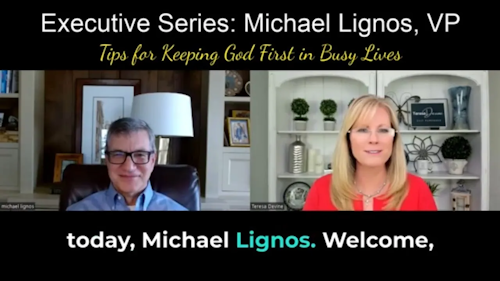Learning how to keep God first amidst busy lifestyles is daunting. Michael Lignos, an experienced technology executive with three decades in the field, recently provided insights on how he balances a demanding executive lifestyle with his Christian faith. In an enlightening discussion, Michael highlighted practical strategies to keep God first with a busy professional life.
Watch the video or listen to the Podcast below.
God First Key Take-a-ways
- Incorporating Faith into Professional Environments: Michael emphasizes the importance of weaving his faith into his everyday work environment, especially during his time at a company that valued religious practices. His approach was challenged, after the company was acquired by a non-faith supported organization, significantly altering the company’s culture.
- Utilizing Visual Cues for Reinforcing God First: To stay aligned with his core values, Michael uses a whiteboard in his office to list his life priorities: faith, family, friends, fitness, and future. This visual reminder helps him maintain focus on what is most important, even during the busiest times.
- Establishing Routine Spiritual Activities: Every morning, Michael engages in spiritual exercises such as reading devotionals, journaling prayers, and meditating. These practices are crucial for starting his day grounded in his beliefs and ensuring that he maintains a spiritual perspective daily.
How to Keep God First Overview
Ligno’s approach to keeping God first and at the center of his life, despite the demands of his career, revolves around proactive strategies. He details the transition of working in a faith-embracing environment to adjusting to a corporate culture that did not prioritize religious practices. This shift came after his former company, which upheld Christian values, was taken over by a larger, secular corporation. The change was stark, removing many of the religious practices that were once integrated into daily operations.
The God First Cultural Disruption
To combat the spiritual vacuum left by the corporate cultural shift, Michael turned to personal strategies that reinforced his commitment to his Christian values. One effective tool he discusses is the use of a whiteboard in his office where he visually lists his top life priorities: faith, family, friends, fitness, and future. This list serves as a daily reminder of his values and helps guide his decisions and actions throughout the day.
God First Spiritual Habits
Michael also underscores the importance of routine spiritual practices. Each morning, he dedicates time to engage in several spiritual activities that include reading devotional materials, writing in his prayer journal, and meditating. These practices help him center himself in his faith before the day begins, providing a foundation that supports him through various challenges and decisions.
Establish God First Relationships
Moreover, Lignos highlights the role of supportive relationships in maintaining a focus on God. He credits his wife and a close network of former colleagues for keeping him connected to his spiritual goals. These relationships, he notes, are vital for accountability and encouragement, especially when navigating environments that may not support religious practices openly.
Additionally, Michael shares how he adapted to the loss of a structured faith environment by establishing new habits that support his spiritual and personal priorities. This adaptation includes creating spaces in his day dedicated to reflection and prayer, ensuring that his faith remains a constant presence in his life despite external changes.
In conclusion
Michael’s narrative is not just about balancing a high-profile career with personal faith; it’s about integrating one’s spiritual identity into every aspect of life, regardless of the setting. His methods demonstrate that maintaining spiritual integrity doesn’t require monumental changes but rather consistent, small actions and reminders that align daily life with one’s deepest values and beliefs.
His story is a compelling reminder of the power of personal agency in nurturing one’s faith through visual reminders, structured practices, and supportive relationships. It offers a blueprint for professionals everywhere who seek to retain their spiritual focus amid the demands of modern careers. This practical approach ensures that personal and spiritual priorities do not fall by the wayside but are instead integral to one’s lifestyle and decision-making processes, promoting a balanced and fulfilling life.
